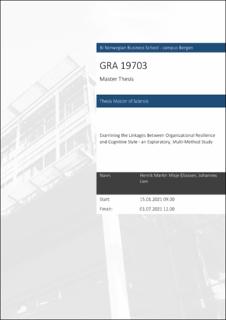Examining the Linkages Between Organizational Resilience and Cognitive Style - an Exploratory, Multi-Method Study
Master thesis

View/
Date
2021Metadata
Show full item recordCollections
- Master of Science [1621]
Abstract
This thesis aims to narrow a research gap by exploring the linkages between
organizational resilience and cognitive diversity. More specifically, we wanted to
investigate cognitive differences in problem-solving style between levels of power in
organizations. Using the VIEW database, quantitatively analyzing the responses of
16,303 subjects working in for-profit organizations, we discovered a significant
cognitive gap between upper management and clerical staff. In a bid to go deeper we
conducted interviews to qualitatively assess if these differences existed in the real
world and to identify potential challenges and opportunities connected to the gap.
We advocate the overarching importance of organizational resilience and how it
can be connected to achieving resilient communities. We argue that cognitive gap can
potentially have a negative impact on resilience capabilities. Thus, effectively
managing the gap is key to increasing organizational resilience.
The inter-item correlation in the quantitative analysis indicated that most
substantial differences could be found between Upper/Senior Management and
Clerical/Other staff in the Orientation to Change dimension and Novelty and Structure
– Authority sub-scales. While the Search Strategy sub-scale lacked statistical
significance, the overall quantitative findings revealed the existence of a cognitive gap.
These findings were supported in the interviews. The interviewees provided clear
evidence of the gap, along with costs caused by the gap and approaches to close the
gap.
Based on the quantitative and qualitative findings we found that leadership
behavior and two-way-communication, which are interconnected, are vital to
effectively managing the gap. We suggest that it would serve leaders well to be more
aware of their own preferences and the preferences of others in the organization and
use that understanding and knowledge to reduce potential personal tension and
maximize collaboration and cooperation. Additionally, they must be provided with
methods and tools on how to engage in effective communication. Implications for
practice and future research is presented, along with limitations.
Description
Masteroppgave(MSc) in Master of Science in Business, Leadership and Change - Handelshøyskolen BI, 2021